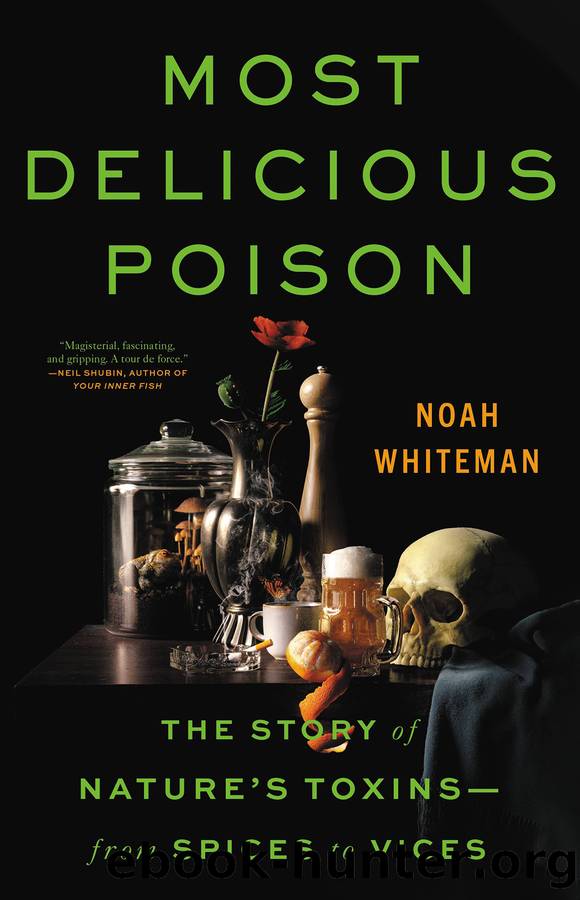Most Delicious Poison by Noah Whiteman

Author:Noah Whiteman [WHITEMAN, NOAH]
Language: eng
Format: epub
Publisher: Little, Brown and Company
Published: 2023-10-25T00:00:00+00:00
In the United Kingdom, people generally drink coffee that contains low to modest levels of cafestol and kahweol (filtered coffee, instant coffee, or espresso). A UK study followed 171,616 people from 2009 to 2018 to determine whether drinking coffee was associated with reduced risk of death, and if so, by how much. In general, those who drank coffee had a lower risk of death than those who did not, and this finding held for the risk of dying from cancer or cardiovascular disease.
But the devil is in the details. A slightly reduced risk of dying was found for those who drank up to 2.5 drinks per day compared to those who didnât drink coffee. The people drinking 2.5 to 4.5 coffee drinks per day were 29 percent less likely to die during the study than were people who drank no coffee. Above 4.5 drinks per day, and the risk of dying during the study was the same as those who consumed up to 2.5 drinks per day.
Those in the middle of the spectrum (i.e., those who drink 2.5 to 4.5 cups a day) were the least likely of all the participants to die. This study comports with a much larger umbrella review of studies that found that drinking 3 to 4 cups per day is associated with a roughly 17 percent lower risk of death than the risk for nondrinkers.
Finally, there was a big potential downside to high caffeine or coffee consumption in pregnancy. Compared with low consumption of coffee, high consumption was associated, on average, with a 31 percent higher risk of low birth weight, 46 percent higher risk of pregnancy loss, and 22 percent higher risk of first trimester preterm birth, and 12 percent higher risk of second trimester preterm birth. There were no elevated risks observed in the third trimester. Chapter 10 will examine what may cause these patterns.
The protective association of coffee drinking is also observed for those who drink decaffeinated coffee. One explanation is that for most of us, coffee, whether caffeinated or decaffeinated, is the single largest source of antioxidants in our diet in the form of polyphenols. As discussed in an earlier chapter, the term antioxidant connotes chemicals that protect against oxidants, cellular stressors produced by our own bodies and the environment.
The potential protective effect of coffee in our diet may be largely due to the presence of these antioxidants in coffee beans. Among these, the chlorogenic acids are the prime suspects. Double-blind, placebo-controlled studies have found that chlorogenic acids in the diet can improve cardiovascular functioning, reduce blood pressure, and decrease the risk of metabolic syndrome. Coffee drinkers consume up to 1 gram of chlorogenic acids per day; by comparison, a typical adult aspirin tablet weighs 325 milligrams, or one-third the amount consumed by coffee drinkers.
This discussion of coffee brings us back full circle to earlier discussions of chlorogenic acids. These chemicals, the same phenolics associated with protecting our health when we drink coffee, are among the toxins weâve seen in earlier chapters.
Download
This site does not store any files on its server. We only index and link to content provided by other sites. Please contact the content providers to delete copyright contents if any and email us, we'll remove relevant links or contents immediately.
Quantitative and Pattern Recognition Analyses of Five Marker Compounds in Raphani Semen using High-Performance Liquid Chromatography by Unknown(4139)
Alchemy and Alchemists by C. J. S. Thompson(3516)
The Elements by Theodore Gray(3053)
The Club by A.L. Brooks(2919)
How to Make Your Own Soap by Sally Hornsey(2897)
Drugs Unlimited by Mike Power(2592)
Wheels of Life by Anodea Judith(2146)
Cracking the LSAT, 2012 Edition by Princeton Review(1948)
Cracking the Sat French Subject Test, 2013-2014 Edition by The Princeton Review(1879)
The Flavor Matrix by James Briscione(1824)
Perfume by Jean-Claude Ellena(1819)
The Cosmic Machine: The Science That Runs Our Universe and the Story Behind It by Scott Bembenek(1757)
The Thing Around Your Neck by Chimamanda Ngozi Adichie(1688)
MCAT Physics and Math Review by Princeton Review(1687)
1000 Multiple-Choice Questions in Organic Chemistry by Organic Chemistry Academy(1657)
Cracking the SAT Premium Edition with 6 Practice Tests, 2017 by Princeton Review(1587)
Handbook of Modern Sensors by Jacob Fraden(1578)
Synchrotron Light Sources and Free-Electron Lasers by Eberhard J. Jaeschke Shaukat Khan Jochen R. Schneider & Jerome B. Hastings(1559)
A is for Arsenic: The Poisons of Agatha Christie (Bloomsbury Sigma) by Kathryn Harkup(1542)
